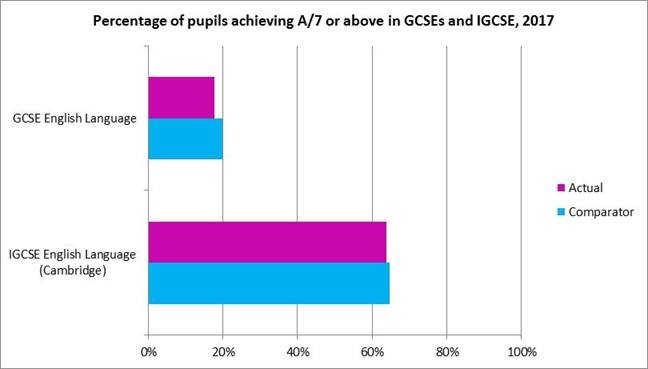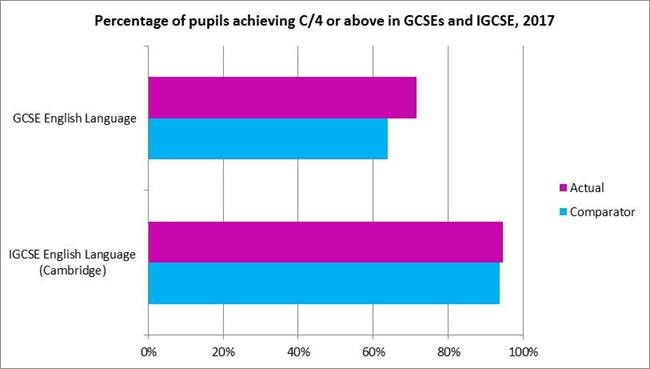In response to a suggestion that International GCSE (IGCSEs) grades are 'easier' than reformed GCSEs, our researcher Tom Benton looked into the methods used in the original research by Datalab.
Over the past few days there has been interest in some
analysis posted by Education Datalab
suggesting that “at the top end of the distribution, perhaps IGCSEs are indeed not graded quite as severely as [England’s] reformed GCSEs”. Cambridge Assessment oversees three major exam boards. Cambridge Assessment International Education (Cambridge International) is one of the organisations that awards international GCSEs – the Cambridge IGCSE. We were interested in Datalab’s results and have investigated Datalab’s techniques for analysing this issue.
By applying the comparative method used by Datalabs to the
IGCSEs offered by Cambridge International only, there is no evidence that Cambridge IGCSEs are graded any more leniently than England’s reformed GCSEs.
Cambridge International employs various approaches to maintaining examination awarding standards, including both
statistical methods and judgement by subject experts. They do not use the method used by Datalab. There are three reasons for this. Firstly, in contrast to the implicit suggestion in Datalab’s analysis, it is widely acknowledged that grade distributions are not the same across all GCSE (or international GCSE) subjects and, as such, ensuring an exact match on this metric is not the main priority in awarding. Secondly, the kind of national
data used in the Datalab analysis is not available at the time of awarding in any case, so cannot feed into decisions about awarding. Thirdly, due to the effect of post results changes, for example from marking reviews, results from comparability studies undertaken a long time after awarding may give slightly different results than they would if they were undertaken at the time of awarding. However, for this analysis we take the method suggested by Datalab as a given and recreate the results but restricting the analysis to IGCSEs that are offered by Cambridge International only. So, this comparison is restricted to Cambridge IGCSE First Language English (specification 0500), as, of the subjects considered in Datalab’s analysis, we have significantly more UK data available for this specification than for Mathematics.
The version of the
National Pupil Database (NPD) available to us is slightly different to the one used by Datalab in their analysis. For this reason, our analysis relies on creating a combined set of data using both information we hold internally as an organisation and data available to us through the NPD. Other than this, we have attempted to reproduce exactly the methodology described by Datalab with the exception that rather than randomly choosing a legacy GCSE for each pupil to act as a comparator, we have averaged results across all possible random choices of comparator subjects that we might make for each pupil. Data from just over 10,000 students in England who took Cambridge IGCSEs in 2017 was included in analysis.
As Education Datalab comments, on the surface UK attainment in IGCSEs is higher than in reformed GCSE – and this would be expected, as the vast majority of entries in the UK are from independent schools where attainment tends to be higher.
Looking into the detail, the results from grade A/7 and C/4 are in figures 1 and 2 below. As can be seen, for England’s reformed GCSEs these figures pretty much exactly reproduce the results provided by Datalab. However, the results restricted to the Cambridge IGCSE First Language English (specification 0500) are different to those in the original blog. Significantly, at grade A/7 the results for the Cambridge IGCSE are very close to those in comparator legacy GCSEs. Indeed, like the reformed GCSEs in English Language, the percentage of students achieving grade A/7 or above is slightly below that in comparator subjects. In other words, even if we accept the method proposed by Datalab, there is no evidence that Cambridge IGCSEs are graded more leniently than England’s reformed GCSEs.

Figure 1:
A comparison of achievement at grade A/7 in Cambridge IGCSE First Language English 0500 and comparator legacy GCSEs in June 2017.

Figure 2:
A comparison of achievement at grade C/4 in Cambridge IGCSE First Language English 0500 and comparator legacy GCSEs in June 2017.
Tom Benton
Principal Research Officer, Cambridge Assessment
You may find these links useful for more information about IGCSEs:
Independent Education Today - GCSE v IGCSE: the debate continues
Schools Week - Don’t blame independent schools for choosing IGCSEs